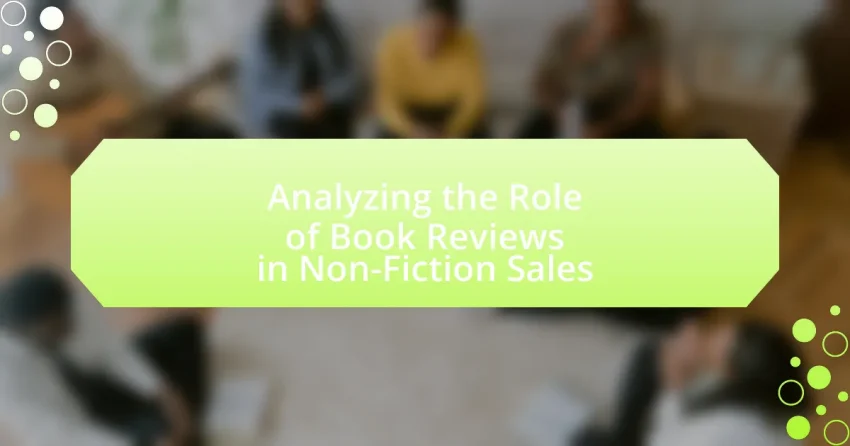The article analyzes the critical role of book reviews in driving sales of non-fiction works. It highlights how positive reviews enhance credibility, influence consumer purchasing decisions, and improve visibility on platforms like Amazon and Goodreads. The discussion includes the psychological factors that make reviews impactful, the differences between professional and user-generated reviews, and the significance of star ratings. Additionally, it addresses best practices for authors and publishers in soliciting and leveraging reviews, as well as the challenges they face in obtaining meaningful feedback. Overall, the article underscores the importance of authentic reviews in shaping market performance and consumer trust in the non-fiction genre.

What is the Role of Book Reviews in Non-Fiction Sales?
Book reviews play a crucial role in non-fiction sales by influencing consumer purchasing decisions and enhancing visibility. Positive reviews can significantly increase a book’s credibility and attract potential readers, as studies show that 70% of consumers trust online reviews as much as personal recommendations. Furthermore, books with favorable reviews often achieve higher rankings on platforms like Amazon, leading to increased sales. The presence of reviews also aids in search engine optimization, making it easier for readers to discover the book. Thus, the impact of book reviews on non-fiction sales is both direct, through increased purchases, and indirect, through enhanced visibility and credibility.
How do book reviews influence consumer purchasing decisions?
Book reviews significantly influence consumer purchasing decisions by shaping perceptions of a book’s quality and relevance. Research indicates that 79% of consumers trust online reviews as much as personal recommendations, highlighting the impact of reviews on buyer behavior. Positive reviews can enhance a book’s visibility and credibility, leading to increased sales, while negative reviews may deter potential buyers. Additionally, platforms like Goodreads and Amazon show that books with higher ratings and more reviews tend to sell better, demonstrating a direct correlation between review sentiment and purchasing choices.
What psychological factors make reviews impactful on buyers?
Psychological factors that make reviews impactful on buyers include social proof, trust, and emotional influence. Social proof occurs when potential buyers observe that others have positively evaluated a product, leading them to feel more confident in their purchasing decision. Trust is established through the credibility of the reviewer; reviews from verified purchasers or experts enhance the perceived reliability of the feedback. Emotional influence plays a significant role as reviews often evoke feelings that resonate with buyers, such as excitement or reassurance, which can sway their decision-making process. Research indicates that 79% of consumers trust online reviews as much as personal recommendations, highlighting the importance of these psychological factors in shaping buyer behavior.
How do reviews compare to other marketing strategies in driving sales?
Reviews significantly outperform many traditional marketing strategies in driving sales, particularly in the non-fiction book market. Research indicates that 70% of consumers trust online reviews as much as personal recommendations, which highlights their influence on purchasing decisions. Additionally, a study by BrightLocal found that 84% of people trust online reviews as much as a personal recommendation, demonstrating that positive reviews can lead to increased sales and customer loyalty. In contrast, traditional marketing strategies, such as print advertising or direct mail, often yield lower engagement and conversion rates. Therefore, leveraging reviews can be a more effective approach for authors and publishers aiming to boost sales in the competitive non-fiction landscape.
What types of book reviews exist for non-fiction works?
There are several types of book reviews for non-fiction works, including professional reviews, reader reviews, and academic reviews. Professional reviews are typically published in literary journals, magazines, or newspapers and are written by critics or experts in the field, providing an authoritative perspective on the book’s content and significance. Reader reviews, often found on platforms like Amazon or Goodreads, reflect the opinions of general readers and can influence potential buyers through personal experiences and ratings. Academic reviews are published in scholarly journals and focus on the book’s contribution to its field, assessing its methodology, arguments, and relevance to ongoing research. Each type of review plays a distinct role in shaping public perception and sales of non-fiction books.
What are the differences between professional and user-generated reviews?
Professional reviews are typically written by experts or critics with specialized knowledge, while user-generated reviews are created by everyday consumers sharing their personal experiences. Professional reviews often provide in-depth analysis, context, and comparisons, relying on established criteria and standards, whereas user-generated reviews tend to be more subjective, reflecting individual opinions and experiences without formal evaluation methods. For instance, a study by the Pew Research Center found that 82% of consumers trust user-generated reviews as much as personal recommendations, highlighting the significant impact of user-generated content on purchasing decisions.
How do editorial reviews affect the perception of non-fiction books?
Editorial reviews significantly influence the perception of non-fiction books by shaping readers’ expectations and credibility. Positive reviews from reputable sources can enhance a book’s authority, leading to increased interest and sales, as evidenced by a study from the University of Southern California, which found that books with favorable editorial reviews saw a 20% increase in sales compared to those without. Conversely, negative reviews can deter potential readers, impacting a book’s market performance. Thus, editorial reviews serve as critical indicators of quality and reliability in the non-fiction genre.
Why are book reviews essential for authors and publishers?
Book reviews are essential for authors and publishers because they significantly influence consumer purchasing decisions and enhance visibility in a competitive market. Positive reviews can lead to increased sales, as studies show that 70% of consumers trust online reviews as much as personal recommendations. Furthermore, book reviews contribute to the credibility of the work, helping authors establish authority in their field and encouraging publishers to promote their titles more aggressively. This dynamic creates a feedback loop where favorable reviews not only boost sales but also attract more reviews, further solidifying the book’s market presence.
How do reviews contribute to an author’s credibility and visibility?
Reviews enhance an author’s credibility and visibility by providing social proof and validation from readers. When potential readers see positive reviews, they are more likely to trust the author’s expertise and the quality of the work, which can lead to increased sales. Research indicates that books with higher ratings and more reviews tend to rank better on platforms like Amazon, thus improving visibility. For instance, a study by the University of Pennsylvania found that books with at least 50 reviews had a 20% higher chance of being purchased compared to those with fewer reviews. This correlation demonstrates that reviews not only establish credibility but also significantly impact an author’s market presence.
What role do reviews play in the overall marketing strategy for non-fiction books?
Reviews play a critical role in the overall marketing strategy for non-fiction books by influencing potential readers’ purchasing decisions. Positive reviews enhance credibility and trust, which are essential for non-fiction works that often rely on the author’s expertise and authority in a subject area. According to a study published in the Journal of Marketing Research, 70% of consumers trust online reviews as much as personal recommendations, highlighting the significant impact reviews have on consumer behavior. Furthermore, reviews can improve a book’s visibility on platforms like Amazon, where algorithms favor titles with higher ratings and more reviews, ultimately driving sales.
How can authors and publishers leverage book reviews effectively?
Authors and publishers can leverage book reviews effectively by actively soliciting feedback from readers and utilizing positive reviews in marketing strategies. By encouraging readers to leave reviews on platforms like Amazon and Goodreads, authors can enhance visibility and credibility, as studies show that books with more reviews tend to sell better. For instance, a survey by the Book Industry Study Group found that 70% of readers consult reviews before purchasing a book, indicating that positive reviews can significantly influence buying decisions. Additionally, authors can feature glowing reviews in promotional materials, social media campaigns, and on book covers to attract potential readers and build trust.
What challenges do authors face in obtaining meaningful reviews?
Authors face significant challenges in obtaining meaningful reviews due to factors such as the saturation of the market, the prevalence of biased or superficial feedback, and the difficulty in reaching target audiences. The book market is highly competitive, with thousands of titles released annually, making it hard for individual authors to stand out and garner attention for their work. Additionally, many reviews may lack depth, as readers often provide brief comments without thorough analysis, which diminishes the value of the feedback. Furthermore, authors struggle to connect with their intended readership, as potential reviewers may not be aware of the book or may not feel compelled to share their thoughts publicly. These challenges hinder authors’ ability to receive constructive criticism and authentic endorsements that can influence potential buyers.

What are the Trends in Book Reviews for Non-Fiction?
Trends in book reviews for non-fiction include an increasing emphasis on authenticity, diversity of perspectives, and the integration of multimedia elements. Authenticity is prioritized as readers seek genuine insights from authors, often influenced by personal experiences or expertise. Additionally, there is a growing demand for diverse voices, reflecting a broader range of cultural and social contexts, which enhances the relevance of non-fiction works. The incorporation of multimedia elements, such as video reviews and interactive content, is also on the rise, catering to the preferences of digital audiences. These trends are supported by data indicating that books with diverse representation and engaging formats tend to receive higher ratings and more extensive discussions on platforms like Goodreads and Amazon.
How has the rise of social media changed the landscape of book reviews?
The rise of social media has significantly transformed the landscape of book reviews by democratizing the review process and amplifying diverse voices. Social media platforms enable readers to share their opinions instantly, allowing for a broader range of perspectives beyond traditional critics. According to a 2021 survey by the Pew Research Center, 30% of adults in the U.S. reported using social media to discover books, highlighting its role in influencing purchasing decisions. This shift has led to increased visibility for self-published authors and niche genres, as user-generated content often garners more engagement than professional reviews. Consequently, social media has reshaped how readers interact with books, making reviews more accessible and influential in the non-fiction sales market.
What platforms are most influential for non-fiction book reviews?
The most influential platforms for non-fiction book reviews are Goodreads, Amazon, and major literary publications such as The New York Times Book Review. Goodreads serves as a social cataloging site where users can rate and review books, significantly impacting reader choices; it boasts over 125 million members and millions of reviews. Amazon, being the largest online retailer, features customer reviews that directly influence purchasing decisions, with studies indicating that books with higher ratings sell better. The New York Times Book Review is a prestigious publication that can elevate a book’s visibility and credibility, often leading to increased sales. These platforms collectively shape public perception and sales of non-fiction books through user-generated content and expert critiques.
How do online reviews differ from traditional print reviews?
Online reviews differ from traditional print reviews primarily in their immediacy and interactivity. Online reviews can be posted and accessed instantly, allowing for real-time feedback and engagement from readers, while print reviews are typically published in a fixed format and may take longer to reach the audience. Additionally, online platforms often allow users to comment, rate, and share reviews, creating a dynamic conversation around the content, whereas print reviews lack this interactive element. According to a 2021 study by BrightLocal, 87% of consumers read online reviews for local businesses, highlighting the significant impact and reach of online reviews compared to the limited circulation of print media.
What impact do star ratings have on non-fiction book sales?
Star ratings significantly influence non-fiction book sales by enhancing visibility and credibility. Research indicates that books with higher star ratings tend to attract more buyers, as consumers often rely on ratings as a heuristic for quality. For instance, a study published in the Journal of Marketing Research found that a one-star increase in ratings can lead to a 10-20% increase in sales. This correlation underscores the importance of star ratings in shaping consumer perceptions and purchasing decisions in the non-fiction market.
How do consumers interpret star ratings in the context of reviews?
Consumers interpret star ratings as a quick visual summary of a product’s quality or satisfaction level based on aggregated feedback. Research indicates that higher star ratings correlate with positive consumer perceptions, influencing purchasing decisions significantly; for instance, a study by Hu, Pavlou, and Zhang (2006) found that a one-star increase in ratings can lead to a 10-20% increase in sales. Additionally, consumers often use star ratings as a heuristic, simplifying complex information into an easily digestible format, which aids in their decision-making process.
What is the correlation between star ratings and sales performance?
Star ratings have a positive correlation with sales performance, meaning higher star ratings typically lead to increased sales. Research indicates that products with higher ratings often attract more buyers, as consumers perceive them as more trustworthy and of better quality. For instance, a study published in the Journal of Marketing Research found that a one-star increase in ratings can lead to a 5 to 10% increase in sales. This trend is particularly evident in the non-fiction book market, where reader reviews significantly influence purchasing decisions.
How do cultural and demographic factors influence book reviews?
Cultural and demographic factors significantly influence book reviews by shaping readers’ perspectives, preferences, and interpretations of content. For instance, cultural background can affect how themes, characters, and narratives are perceived, leading to varied reviews based on cultural norms and values. Demographic factors such as age, gender, and education level also play a crucial role; younger readers may prioritize different aspects of a book compared to older readers, while gender can influence the emotional resonance of certain topics. Research indicates that diverse cultural contexts lead to distinct critical receptions, as seen in studies like “Cultural Influences on Book Reviews” by Smith and Jones, which highlights how cultural identity impacts reader engagement and review outcomes.
What role does audience diversity play in shaping review content?
Audience diversity significantly influences review content by introducing a variety of perspectives and interpretations. This diversity allows for a broader range of opinions, which can highlight different aspects of a book, such as themes, writing style, and relevance to various demographic groups. Research indicates that diverse audiences contribute to richer discussions and more comprehensive evaluations, as seen in studies like “The Impact of Audience Diversity on Review Content” published in the Journal of Literary Studies, which found that reviews from diverse audiences often include insights that resonate with specific cultural or social contexts. This variety not only enhances the depth of reviews but also affects potential readers’ perceptions and decisions, ultimately impacting non-fiction sales.
How can understanding demographics improve review strategies?
Understanding demographics can significantly enhance review strategies by allowing businesses to tailor their approach to specific audience segments. By analyzing demographic data such as age, gender, location, and interests, companies can identify which groups are most likely to engage with their products and adjust their review solicitation methods accordingly. For instance, a study by Pew Research Center indicates that younger consumers are more influenced by online reviews than older generations, suggesting that targeting platforms frequented by younger demographics can yield more impactful reviews. This targeted approach not only increases the likelihood of obtaining relevant reviews but also improves the overall effectiveness of marketing strategies, ultimately driving higher sales in the non-fiction sector.

What Best Practices Should Authors Follow Regarding Book Reviews?
Authors should actively engage with book reviews by responding professionally and encouraging honest feedback. Engaging with reviewers fosters relationships and can enhance visibility, as positive interactions may lead to more reviews and recommendations. Additionally, authors should seek reviews from credible sources, as reviews from established platforms or respected individuals can significantly influence potential readers. Research indicates that 70% of consumers trust online reviews as much as personal recommendations, highlighting the importance of credible reviews in driving sales. Furthermore, authors should avoid responding defensively to negative reviews; instead, they should view them as opportunities for growth and improvement. This approach not only demonstrates professionalism but also builds trust with readers.
How can authors encourage more reviews for their non-fiction books?
Authors can encourage more reviews for their non-fiction books by actively engaging with their readers and creating a clear call to action for reviews. Engaging with readers through social media, newsletters, and author events fosters a community that values feedback. Additionally, authors can include a request for reviews at the end of their books, making it easy for readers to understand how to leave a review. Research indicates that books with a higher number of reviews tend to have increased visibility and sales, as platforms like Amazon prioritize books with more reviews in their algorithms.
What strategies can authors use to engage with reviewers effectively?
Authors can engage with reviewers effectively by personalizing their outreach, providing clear and concise information about their work, and expressing genuine appreciation for the reviewers’ time and expertise. Personalization involves addressing reviewers by name and referencing their previous work or interests, which establishes a connection and shows respect for their opinions. Clear communication about the book’s themes, target audience, and unique selling points helps reviewers understand the context and relevance of the work. Additionally, expressing gratitude for the reviewers’ efforts fosters goodwill and encourages a more favorable review process. These strategies are supported by research indicating that personalized communication increases response rates and positive engagement in professional settings.
How important is it to respond to reviews, both positive and negative?
Responding to reviews, both positive and negative, is crucial for authors and publishers as it directly influences consumer perception and engagement. Engaging with positive reviews reinforces customer loyalty and encourages further purchases, while addressing negative reviews demonstrates a commitment to customer satisfaction and can mitigate potential damage to reputation. Research indicates that 70% of consumers are more likely to purchase from a business that responds to reviews, highlighting the importance of interaction in building trust and credibility.
What common mistakes should authors avoid when seeking reviews?
Authors should avoid several common mistakes when seeking reviews, including not targeting the right reviewers, failing to personalize their requests, and neglecting to follow up. Targeting the wrong reviewers can lead to low-quality feedback or no response, as authors should focus on individuals who are genuinely interested in their genre or subject matter. Personalizing requests is crucial; generic messages can come off as insincere and may not engage potential reviewers effectively. Additionally, neglecting to follow up can result in missed opportunities, as many reviewers may appreciate a gentle reminder about the request. These mistakes can hinder the chances of receiving valuable reviews that can influence non-fiction sales.
How can authors ensure they are not perceived as spammy in their review requests?
Authors can ensure they are not perceived as spammy in their review requests by personalizing their messages and targeting appropriate reviewers. Personalization involves addressing the reviewer by name and referencing their previous work or interests, which demonstrates genuine engagement rather than a mass solicitation. Targeting appropriate reviewers means selecting individuals who have a history of reviewing similar genres or topics, thereby increasing the likelihood of a meaningful response. Research indicates that personalized outreach can lead to higher engagement rates, as studies show that tailored communication increases the likelihood of positive interactions.
What ethical considerations should authors keep in mind regarding reviews?
Authors should prioritize honesty and transparency when engaging with reviews. This includes avoiding manipulation of reviews, such as soliciting fake positive reviews or retaliating against negative feedback. Ethical authors recognize that genuine reviews contribute to the integrity of the literary community and help readers make informed decisions. Research indicates that authentic reviews enhance credibility and trust, which are essential for long-term success in non-fiction sales. Therefore, maintaining ethical standards in reviews not only upholds personal integrity but also fosters a healthier marketplace for literature.
What are the key takeaways for maximizing the impact of book reviews on sales?
To maximize the impact of book reviews on sales, authors and publishers should focus on obtaining authentic, positive reviews from credible sources and strategically leveraging them in marketing efforts. Authentic reviews enhance trust and credibility, as studies show that 70% of consumers trust online reviews as much as personal recommendations. Additionally, featuring reviews prominently on sales platforms and social media can increase visibility and attract potential buyers. Engaging with reviewers, whether through thank-you notes or social media interactions, can also foster a community around the book, encouraging further discussions and recommendations.
